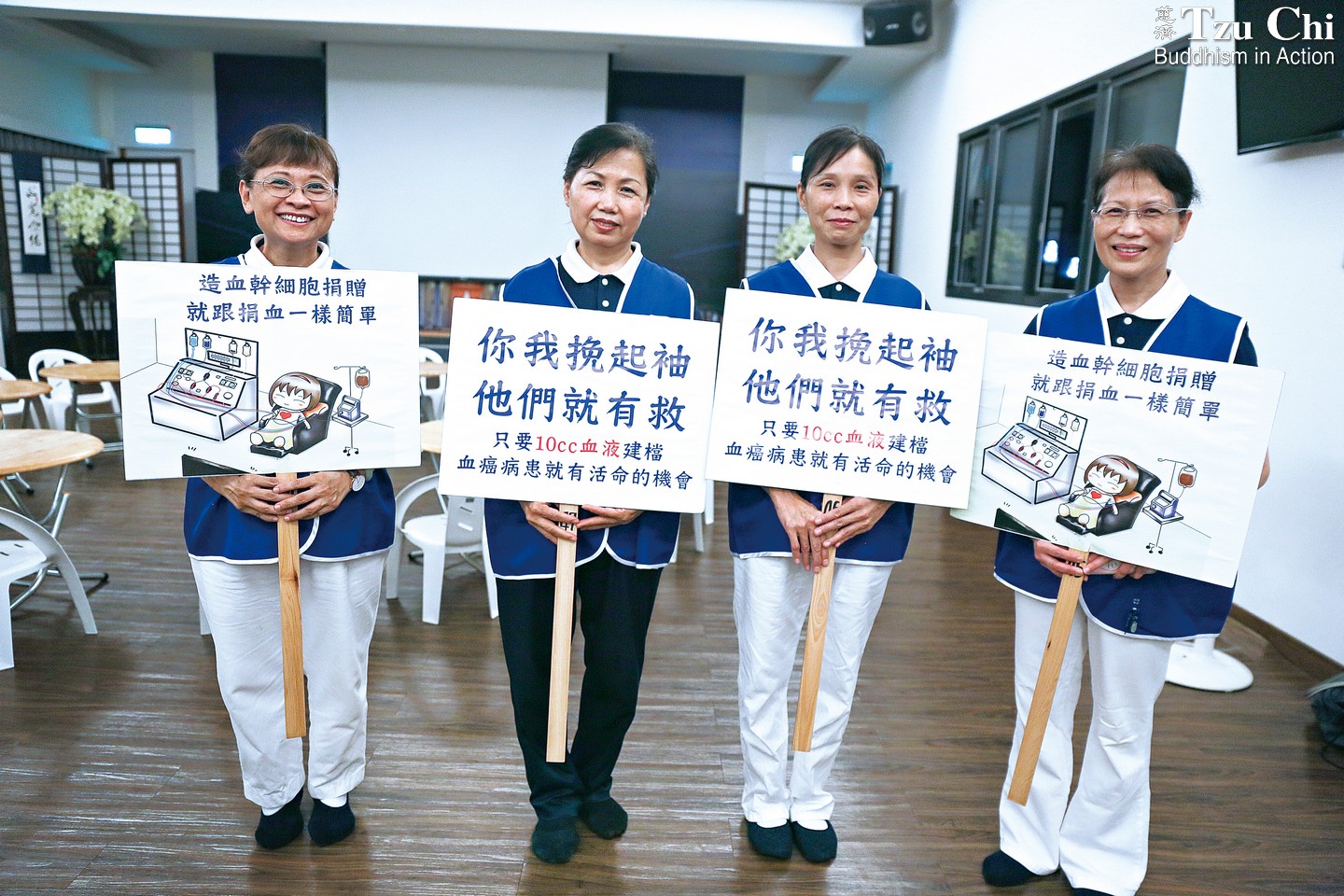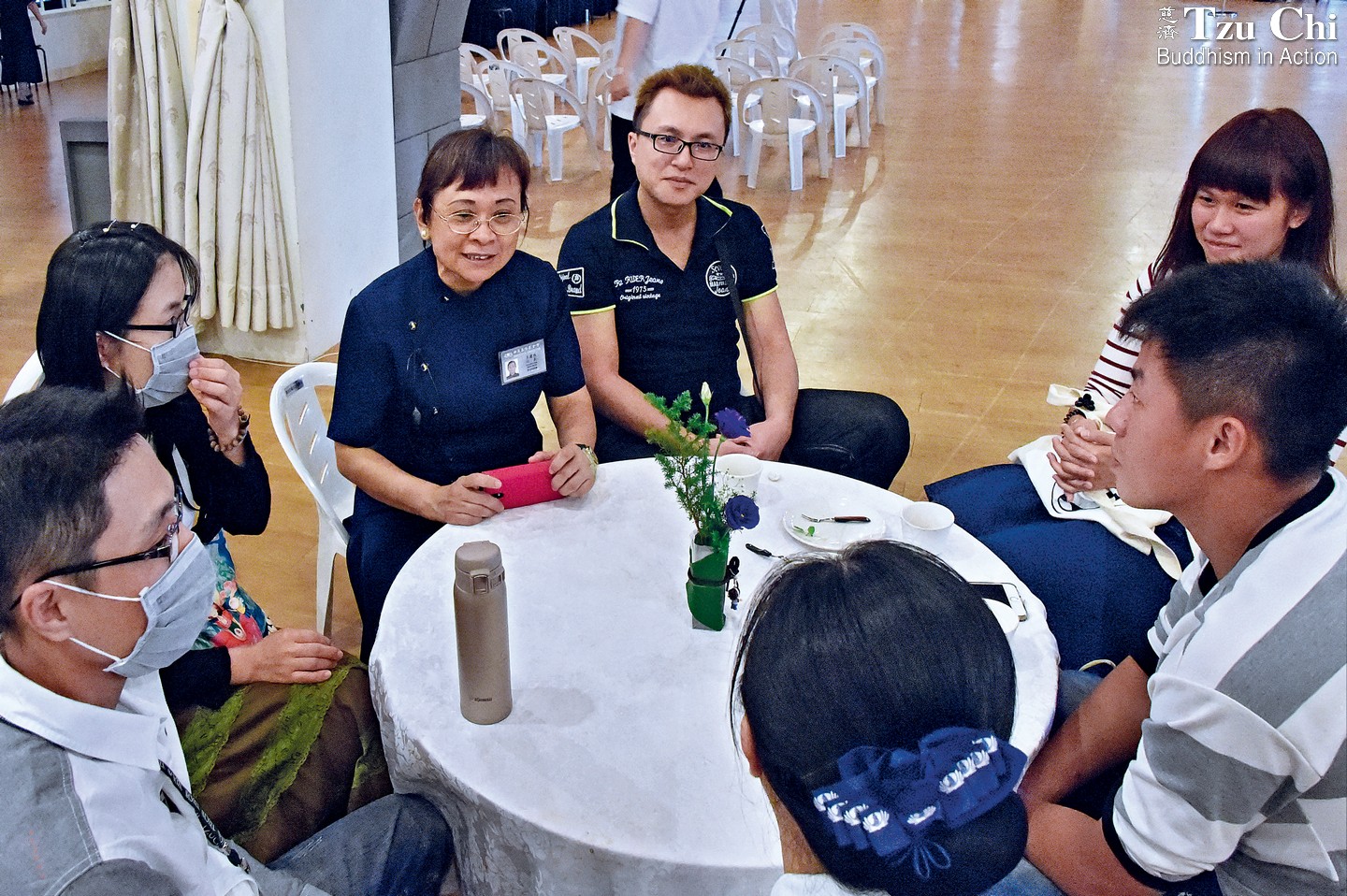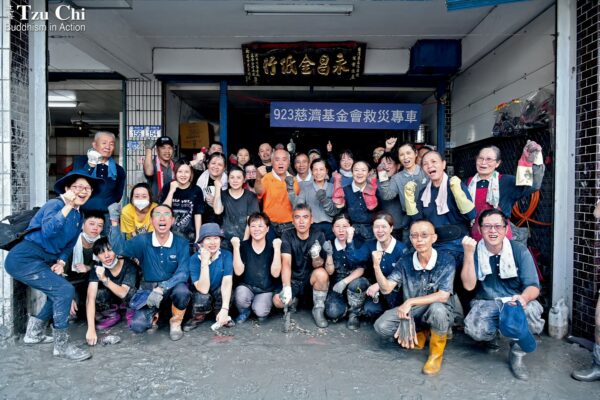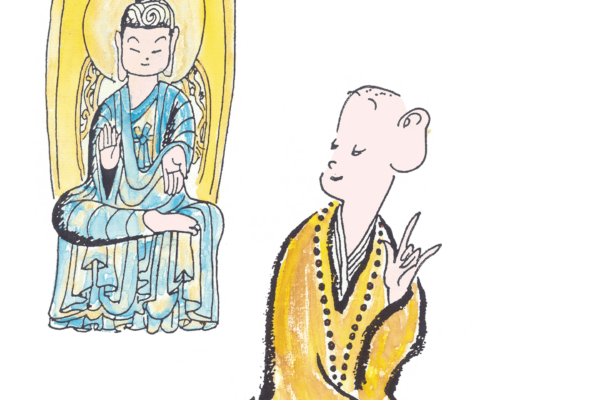Narrated by Cho Li-chu
Interviewed and compiled by Liao Zhe-min
Photo courtesy of Cho Li-chu
Translated by Wu Hsiao-ting

The serious illness I suffered at age 60 brought home to me what a tremendous blessing it is to live each day in safety and good health. It also made me realize I didn’t empathize enough with the patients and families for whom I provided care.
One autumn day in 2019, I was suddenly hit with leg pain. I attributed it to hiking in the mountains a few days earlier and dismissed it, but the pain persisted. Over the next few days, my body became increasingly stiff, making even simple actions like standing up from a chair difficult. Eventually, I went to see a doctor who diagnosed me with degenerative knees. He prescribed muscle relaxants and painkillers, but they didn’t provide much relief.
I volunteer for Tzu Chi’s bone marrow donation program. After my leg pain episode, a blood sample drive was soon taking place to enlist potential stem cell donors. The day before the event, I visited a clinic to receive an injection of a strong pain reliever, allowing me to help out at the drive. The drive went off without a hitch, and I returned home safely. However, as I was going to bed that night, I suddenly felt extremely unwell and had to be rushed to the hospital. By the time I arrived, my body was stiff all over. The pain was so severe that I couldn’t even turn over in bed. The doctor who treated me had no choice but to administer morphine injections to ease my pain.
I spent over 20 days in the hospital, and during that time, I developed a fever at the same time every day. The doctors ran so many blood tests that my arms were soon dotted with needle marks from the frequent blood draws. I underwent several other tests, including an ultrasonic exam and a CT scan. The bone marrow aspiration test was particularly excruciating. It caused so much pain that even the caretaker my family had hired for me fainted when she saw how much I was suffering.
My friends who visited me at the hospital were worried that I didn’t have long to live. I was worried about the same. However, all of my test results came back normal, and since the medical staff couldn’t determine the cause of my symptoms, I was eventually discharged from the hospital. Over the next three weeks, I was plagued with panic, sleeplessness, and bloating. I was too weak to even stand. My husband had it tough taking care of me because I was unable to do anything on my own.
At an outpatient clinic in Taipei Tzu Chi Hospital, I was finally diagnosed with antiphospholipid syndrome by Dr. Chen Chen-hung (陳政宏), a rheumatology and immunology specialist. This condition is characterized by the immune system producing antibodies that attack body tissues, and it can be difficult to diagnose. Unfortunately, there is currently no cure for this disease.

Cho Li-chu (卓麗珠, first from left) and her fellow Tzu Chi volunteers hold up signs encouraging people to sign up as stem cell donors to help save people’s lives.
LU PIN-JIA
Running on empty
Following my diagnosis with antiphospholipid syndrome, I began a two-year biological therapy program that involved receiving injections every six months. Concurrently, I started practicing standing and walking. The initial efforts were quite difficult, but I was thrilled when I could finally take a few steps without needing to hold on to anything. With my doctor’s consent, I attended many physical therapy courses at the hospital to accelerate my recovery. They proved fruitful, so much so that I was eventually able to walk independently, without any support.
Because I started my treatment early, I recovered well. I feel incredibly lucky. Though I still have to take medications, my illness has taught me to appreciate and count my blessings more. It’s made me realize how precious it is to live each day in safety and good health.
More than 20 years ago, before I joined Tzu Chi, I experienced a difficult period in my life. At the time, I felt deeply resentful towards my husband for his unwise investments with his friends, which left our family with a lot of debt. The situation was overwhelming, and I felt like there was no way out. Previously, I had been a strict and domineering manager at a foreign company, and after my husband’s failed investments, I took it upon myself to pay off his debts by running a breakfast shop. At the time, I felt I was the most important person in my family, and acted accordingly. My two children could tell by the look on my face when I arrived home in a bad mood, and took to immediately retreating to their rooms. Only my husband remained in the living room—he had nowhere else to go.
Because my husband felt remorseful about the debt he had accumulated, he made a sincere effort to make amends by contributing more around the house. Despite his efforts, I failed to appreciate his attempts at making up for his mistakes. I would easily grow impatient in his presence and speak to him in a sarcastic tone. I never hesitated to make him know how capable I was and what a loser he was.
During that period, I was a difficult person to interact with, much like a prickly hedgehog. My arrogance was palpable, but deep down, I knew that I was not happy with who I had become. I couldn’t shake the feeling that there was something mentally wrong with me. It wasn’t until I saw this aphorism by Dharma Master Cheng Yen that I realized what my real problem was: “Forgiving others is being kind to yourself.” I thought I had forgiven my husband, but it couldn’t have been farther from the truth.
Given my background in nursing, it was natural for me to volunteer for Tzu Chi’s bone marrow donation program after I joined the organization. As part of my role, I provided care and support to patients and their families as they waited for stem cell transplants. Despite my knowledge of the suffering these patients endured, I didn’t think I truly empathized with them. While I encouraged patients to stay positive and keep fighting, my words lacked the power I had hoped for. It seemed like I had exhausted my inner resources in my attempts to help them. I recall having these thoughts six months before falling ill. Who was to know that heaven would soon give me a chance to become a patient myself to experience the pain a typically healthy person had no way of finding out about?
Being someone who had always taken care of others, I found myself feeling uneasy when my role suddenly changed, and I became the one who needed care. My discomfort only grew when I had to rely on a wheelchair to move around. Although I appreciated visitors during my hospital stay, I felt desolate once they left and I was alone in my room. Each day felt interminable. When dusk finally fell I’d check the time only to find that it was just six o’clock. I watched with envy as the cleaning lady bustled around with her broom. Eating and sleeping became nearly impossible. I found myself lying awake all night, waiting for the next day to dawn. Even when I thought I had finally fallen asleep, I’d wake up to find that only a few minutes had passed.
My personal experience made me reflect on the patients who had undergone stem cell transplants to save their lives. They must have never imagined they would become victims of blood cancer, just as my illness had caught me completely off guard. After the transplant, they had to lie alone in a sterile room. Food was tasteless to them, and they must have been deeply worried about whether the transplant would be successful. Their loneliness, helplessness, and fear…I could finally understand what it was like.

Cho talks to participants of a blood sample drive held to enlist potential stem cell donors.
ZHANG YUAN-CONG
When you aren’t the master of your own body
The loss of control over my own body hit me hard, given my previously independent nature. I must have shed the most tears in my entire life during the time I was ill. I had no idea I could cry so easily. After being discharged from the hospital, I spent nearly a month lying on the living room couch, unable to alleviate my bodily discomfort and feeling completely lost about my future. Negative thoughts plagued me constantly, and I felt like I was living in hell. All I could do was recite a Buddhist repentance text and let my tears flow.
After going through such a life-altering experience, I’ve come to adopt a more philosophical outlook on life. I’ve realized that if death is the ultimate outcome, then many things that once seemed so serious are no longer worth worrying about. Dharma Master Cheng Yen once taught that with a mere shift in mindset, we can transform hell into heaven, and vice versa. Thus, whenever a negative thought enters my mind, I remind myself that it’s not right and instead chant the Buddha’s name to clear my mind. Similarly, when I feel overwhelmed with work, I find ways to reduce stress, such as singing or other stress-reducing techniques.
As long as I can still move, I’ll be happy to give. The most important thing for me now is to live a meaningful life, which for me now doesn’t lie in material success or accomplishments but in making positive differences in others’ lives. I’m in my mid-60s now. I believe that by fulfilling my roles as a daughter, wife, mother, and volunteer the best I can, I can live a fulfilling life with no regrets. Even if impermanence strikes and I am unable to see tomorrow, I will have peace of mind knowing I have lived well.
My heart has softened because I have let go of my attachments to my career objectives, and I am more patient and attentive when listening to others. I remember that before I fell ill, a terminal cancer patient I helped care for repeatedly expressed worries about her two children. At the time, I just told her not to think too much about it, but now I realize that I could have shown her more concern. I wish I had held her hand and asked, “Are you sensing anything?” I understand the feeling of helplessness that patients can experience, and if it were me now, I would be better able to empathize with her.
Showing sincere care and compassion to terminally ill patients is vital in helping them feel surrounded by love. While there may not be much we can do for them, we can always lend a listening ear and offer them comfort. Sometimes, it’s not even necessary to say much. True sincerity can make all the difference.
I’m infinitely grateful to my husband for being the best caregiver when I needed it the most, especially considering how mean I had been to him before. “I always thought it’d be me who would have to take care of you my entire life, and I’d have been willing to do that,” I said to him. “Who knew that you’d become my caregiver first….” Having lost my abilities to tend to my own needs, I’d say “I’m sorry” and “thank you” repeatedly to my husband when he was helping me with anything. He was considerate and patient, always comforting me when I was in pain. Every time I said I was hurting, he’d soothe me and say: “If you feel like crying, just do it. I’m sure the pain will pass quickly.”
Caregiving is undoubtedly a difficult task, and it’s essential to be understanding when caregivers lose their temper. They also need to let off steam from time to time. After I became a patient, I also came to realize the sense of guilt a patient can feel about becoming a burden on their family.
My illness has taught me so much. The pain I went through was something totally new to me and it awakened a new me. The timing of it all seemed almost symbolic. It was during the month of my 60th birthday that the illness struck me. Maybe it was a gift from heaven.



